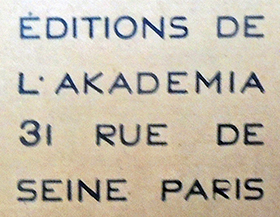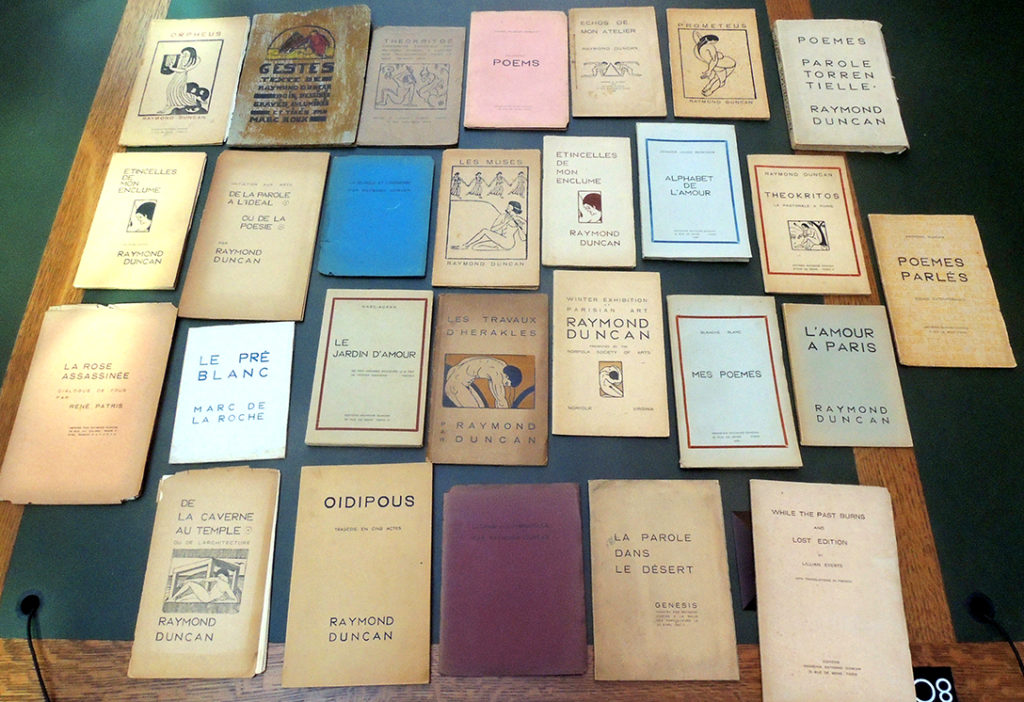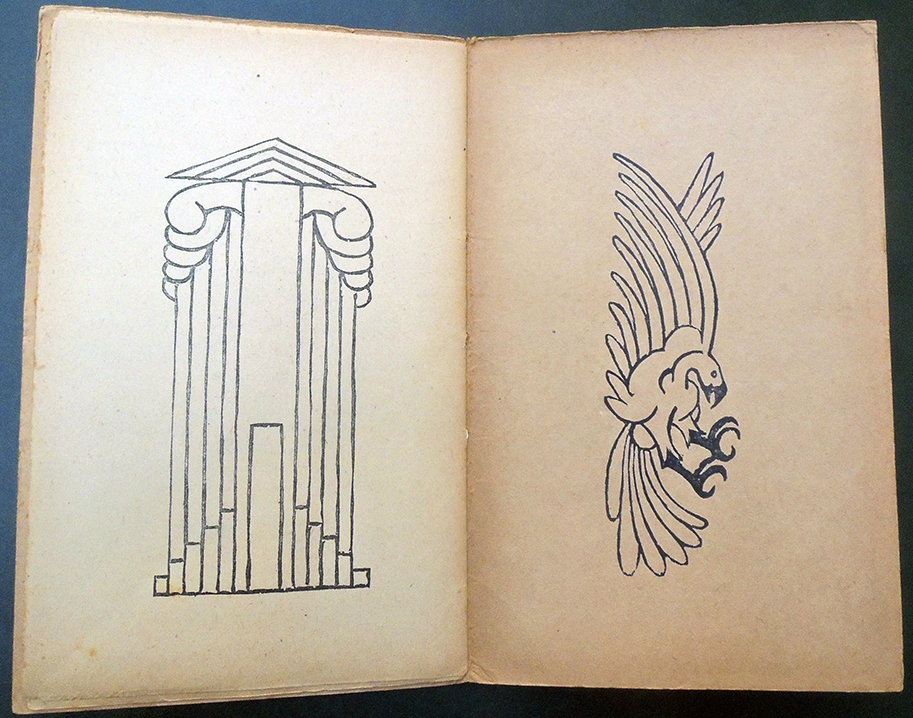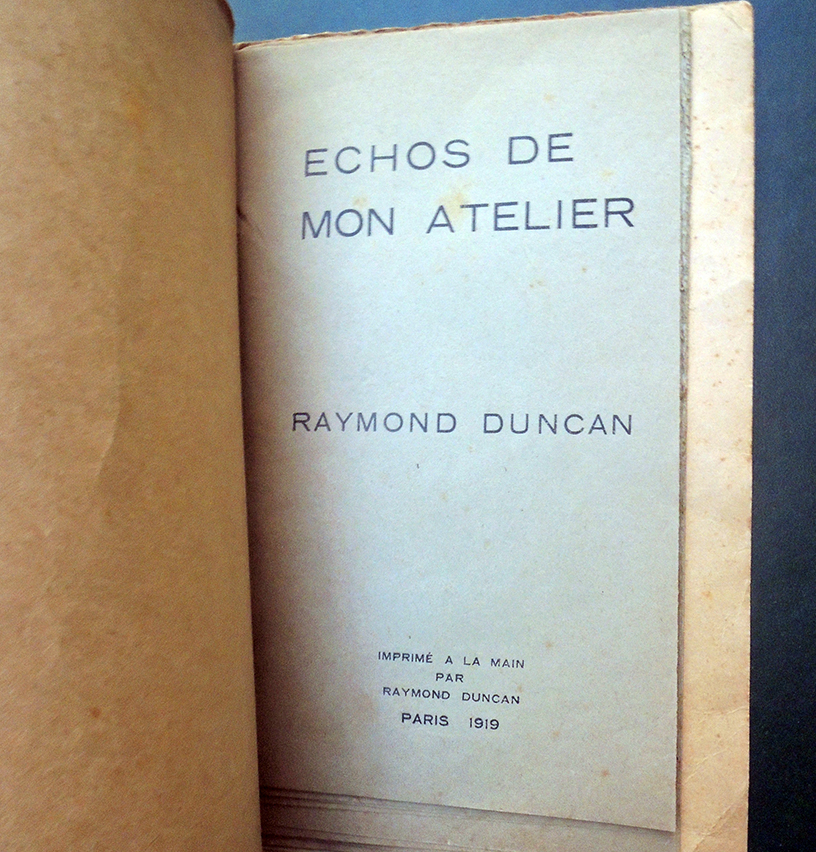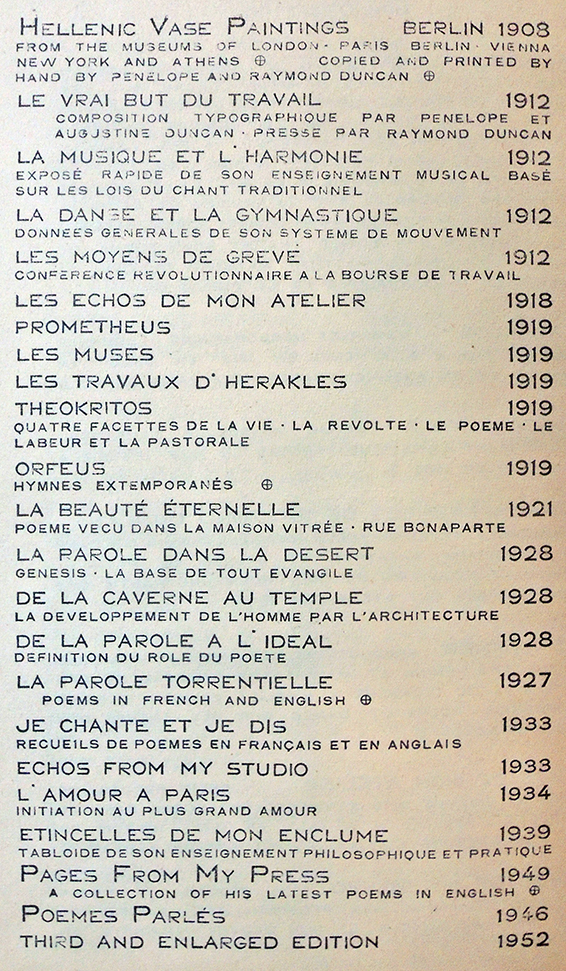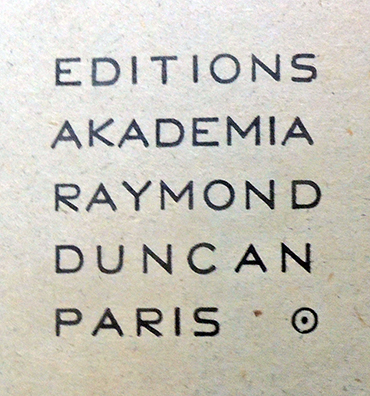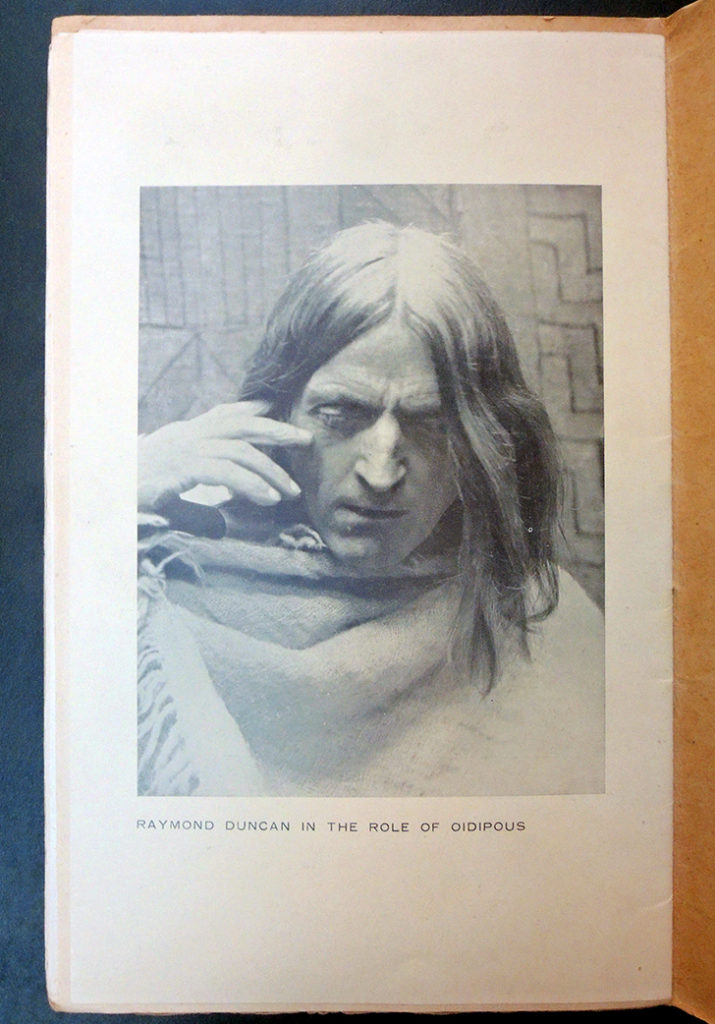Thirty books dating from 1914 to 1951 printed and published by Raymond Duncan (1874-1966) are now held in the Graphic Arts Collection at Princeton. It appears to be the most complete collection outside the Bibliothèque nationale de France.
The older brother of the celebrated dancer Isadora Duncan, Raymond was also a dancer, as well as a philosopher, spinner, weaver, and printer of both letterpress books and decorated fabrics. Born in San Francisco, where he came to know Leo and Gertrude Stein, Raymond lived in Paris, Berlin, Athens, and New York City at various times throughout his bohemian life. He pioneered a holistic life-style inspired by ancient Greece and founded in Paris in 1911 the Akademia, a school where weekly concerts were held, international conferences organized, and useful arts taught free.
From 1911 on, Duncan established a private letter press in Paris and created a typeface “nearest to his ideal” following the principles of upper-case Greek letters: “I chose the nearest makeshift toward my letters at the foundry of Allain Guillaume Paris, type that was made for imitation engraving” (L’Alphabet, 1948). The collection includes Gestes (1921), the book by Duncan, but entirely engraved and illustrated, and self-published by his friend Marcel Roux. More about individual titles to come. Here is the list:
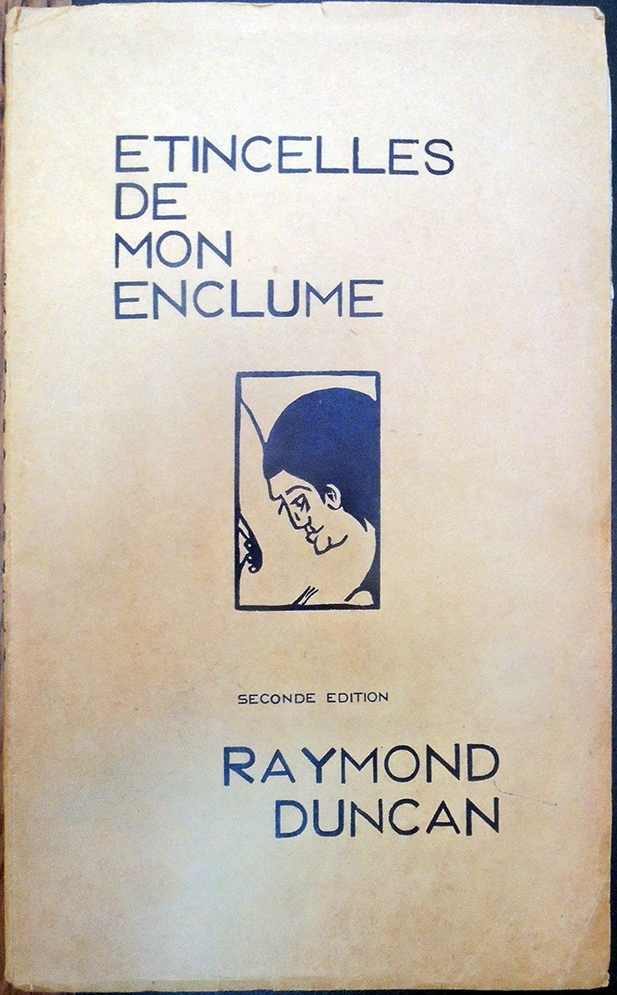 1 – Pamphlets and books by Raymond Duncan:
1 – Pamphlets and books by Raymond Duncan:
Raymond Duncan (1874-1966). Les Moyens de grève. Conférence par Raymond Duncan à la Bourse du Travail, Paris, le 5 mai 1912, sous la présidence du camarade Georges Yvetot. Paris: Akademia Raymond Duncan, 1914. 8vo, stitched. Conference held during the strike of 1912 about a new way of social struggle.
Raymond Duncan (1874-1966). Echos de mon atelier. Paris: Imprimé à la main par Raymond Duncan 21 rue Bonaparte, 1919. 8vo, stitched. Duncan’s philosophical manifesto, beautifully printed, on one side of each leaf. Illustrated with 3 woodcut vignettes.
Raymond Duncan (1874-1966). La Danse et la Gymnastique. Conférence faite le 4 mai 1914 à l’Université hellénique. Paris: Akademia Raymond Duncan, 1914. 8vo, purple wrappers. From June 1913 to the end of the Great War Raymond Duncan established a community in Greece and in Albania during the Balkan Wars. Very few titles have been issued on his press during this period. Duncan developed his theory of movement at the age of 17 based on the economy of work and awareness of the body during labor. Gymnastics were intended to prepare bodies for dance and considered as a salvation tool for humanity.
Raymond Duncan (1874-1966). La Musique et l’Harmonie. Conférence faite le 6 mai 1914, à l’université hellénique par Raymond Duncan ; conférence faite le 6 mai 1914, à l’Université hellénique, Salle de géographie. Sténographie d’Aristide Pratelle. Paris: Akademia Raymond Duncan, 1914. 8vo, blue wrappers.
Raymond Duncan (1874-1966). Les Travaux d’Héraklès, Conférence par Raymond Duncan, à l’Université philosophique, Paris, 9 mars 1919. [Bois de Menalkas Duncan.]. Paris: Editions Raymond Duncan, 1919. Pamphlet 8vo, stitched. Illustrated with 5 woodcuts, engraved by the author’s son Menalkas, at the age of 15: 2 full-page, 1 repeated on wrappers, hand-colored. After the war Duncan’s press was installed 21 rue Bonaparte.
 Raymond Duncan (1874-1966). Prometheus (les grands crucifiés). Conférence par Raymond Duncan à l’université philosophique Paris le 16 mars 1919. Paris: Raymond Duncan, 1919. 8vo, stitched. Illustrated with six woodcuts: 4 full-page, 2 vignettes.
Raymond Duncan (1874-1966). Prometheus (les grands crucifiés). Conférence par Raymond Duncan à l’université philosophique Paris le 16 mars 1919. Paris: Raymond Duncan, 1919. 8vo, stitched. Illustrated with six woodcuts: 4 full-page, 2 vignettes.
Raymond Duncan (1874-1966). Les Muses. Les neuf filles de Mnimosyni. Leur éloge par Raymond Duncan à l’université philosophique Paris le 30 mars 1919. Paris: Raymond Duncan, 1919. 3 full-page woodcuts, one repeated, one woodcut vignette to wrappers. Duncan states his future goals: “he visited the large cities of the world in search of the Nine muses. Arriving in Paris and not finding them, he realized that he must create them himself or at least provide an atmosphere in which nine muses might survive” (Roatcap, Raymond Duncan, p. 22).
Raymond Duncan (1874-1966). Theokritos. Conférence pastorale par Raymond Duncan à l’université philosophique. Paris: imprimé à l’oeuvre Raymond Duncan, 1919. 8vo, stitched. Illustrated with five woodcuts: one half-page to title page and wrappers, 2 full page, 2 vignettes.
Raymond Duncan (1874-1966). Theokritos. Same publication re-issued after 1929 at the address 31 rue de Seine, with new wrappers.
Raymond Duncan (1874-1966). Orpheus. Les Mystères d’Eleusis. Une conférence et quelques hymnes par Raymond Duncan, 16 février 1919. Paris: Imprimé d’après la stéonographie à l’Akademia Raymond Duncan, 1919. Illustrated with one full-page woodcut repeated on wrappers and two vignettes. Wrappers printed in red and black. 8vo, stitched.
Raymond Duncan (1874-1966). La Parole dans le désert. Genesis chantée par Raymond Duncan à la Salle des Agriculteurs le 22 avril 1920. [Paris: [ca. 1920]. 8vo, stitched.
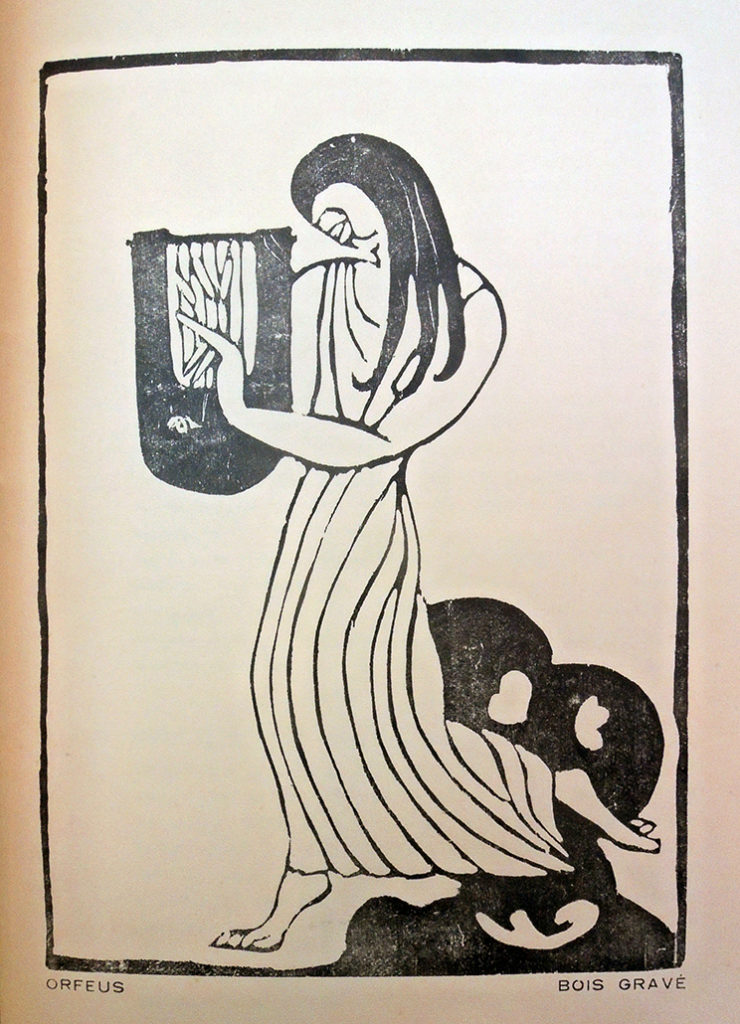
Raymond Duncan (1874-1966). Gestes. Bois dessinés, graves, enluminés et tirés par Marc Roux. No place [Paris, Marcel Roux], 10 April 1921. 4to, unbound, illustrated wrappers. A remarkable and rare book, woodcut throughout, illustrated with 15 full-page hand-colored plates, plus 2 woodcuts on the wrappers. Gouache highlight throughout the engraved text printed in light brown ink. First edition self-published in 125 copies: one of 100 copies (not numbered). The book was entirely woodcut, text and illustration, by the author’s friend Marcel Roux (1878-1922), named here Marc.
Raymond Duncan (1874-1966). Oidipous. Tragédie en cinq actes. Présenté la première fois à au théâtre Femina à Paris le 6 avril 1927. Paris: Editions de l’Akademia, 1927. 8vo. With an abstract of the theatrical works by Raymond Duncan at the end. Autograph inscription to title page, reproduction of a photograph of the author mounted to preliminary leaf.
Raymond Duncan (1874-1966). Poèmes de parole torrentielle. [Paris]: Raymond Duncan, 1927. 8vo. One of 200 large paper copies, signed and inscribed by the author.
Raymond Duncan (1874-1966). De la caverne au temple ou de l’architecture. Paris: Editions Raymond Duncan, no date [ca. 1928]. 8vo, illustrated with two woodcut vignettes to wrappers. A conference on architecture followed by a debate with the audience.
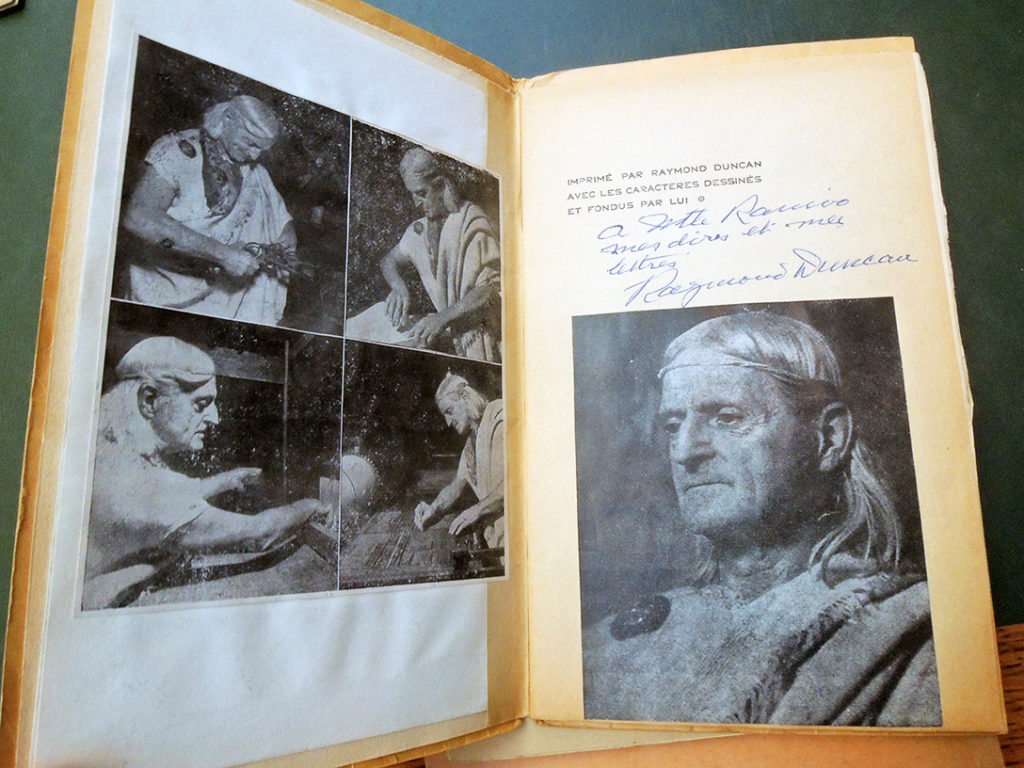 Raymond Duncan (1874-1966). Initiation aux arts. De la parole à l’idéal ou de la poésie. Conférence faite rue de la Sorbonne à Paris le 11 février 1928. Paris: Editions Raymond Duncan, 1928. Large 8vo, stitched. Printed in 500 copies.
Raymond Duncan (1874-1966). Initiation aux arts. De la parole à l’idéal ou de la poésie. Conférence faite rue de la Sorbonne à Paris le 11 février 1928. Paris: Editions Raymond Duncan, 1928. Large 8vo, stitched. Printed in 500 copies.
Raymond Duncan (1874-1966). L’Amour à Paris. L’Angoisse de la solitude et la passion de la foule en douleurs d’enfantement de l’amour du nouveau siècle. Conférence donnée le 22 janvier 1932. Paris: Editions Raymond Duncan, 1932. 12mo. This conference was published rue de Seine, where the Akademia moved in 1929. One year later Duncan purchased a “Le Roy founding machine rebuilt especially for me to found type from the smallest up to 36 points and since I have been printing nearly exclusively from my own type” (l’Alphabet).
Raymond Duncan (1874-1966). Etincelles de mon enclume. Paris: Akademia Raymond Duncan, no date [1937]. Narrow 8vo, stitched. Wrappers printed in sepia. Collection of quotes from conferences and articles by Raymond Duncan, dated between 1912 and 1937. Bibliography of books printed by Raymond Duncan. Autograph inscription to Jessie Hara, August 18, 1946, to title.
Raymond Duncan (1874-1966). Etincelles de mon enclume. Second edition, enlarged. Paris: Akademia Raymond Duncan, 1939 [1955]. Wrappers printed in black. Portraits of Raymond Duncan mounted in. Edited by Raymond Duncan’s second wife Aia Bertrand, a Latvian expatriate. Autograph inscription to half title.
Raymond Duncan (1874-1966). Poèmes parlés. Essais extemporanés. Paris: Akademia Raymond Duncan, no date [ca. 1949]. 8vo. Edition limited to 500 copies. Collection of texts presented by Raymond Duncan at the Akademia principally during WW2.
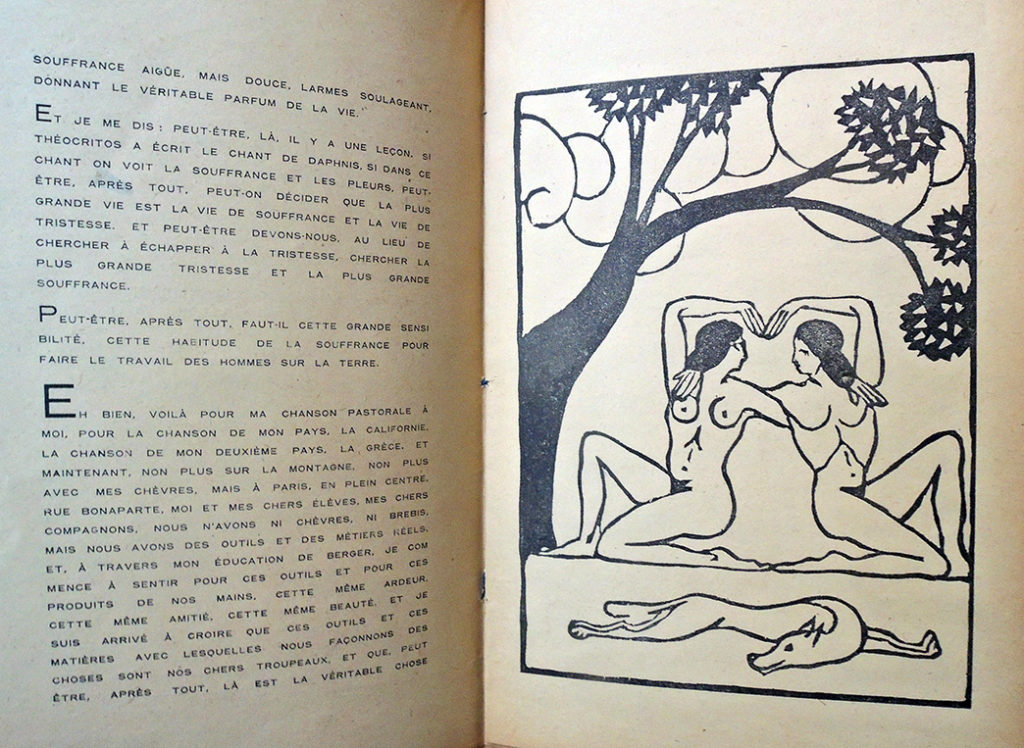
Raymond Duncan (1874-1966). Winter Exhibition of Parisian Art. Raymond Duncan presented by the Norfolk Society of Arts. Paris: Editions Raymond Duncan, no date [ca. 1950]. 8vo, stitched. Exhibition catalogue illustrated with reproductions of woodcuts, paintings and portraits. Wrappers illustrated with to woodcut vignettes printed in two colors. Copy printed on simili-japon.
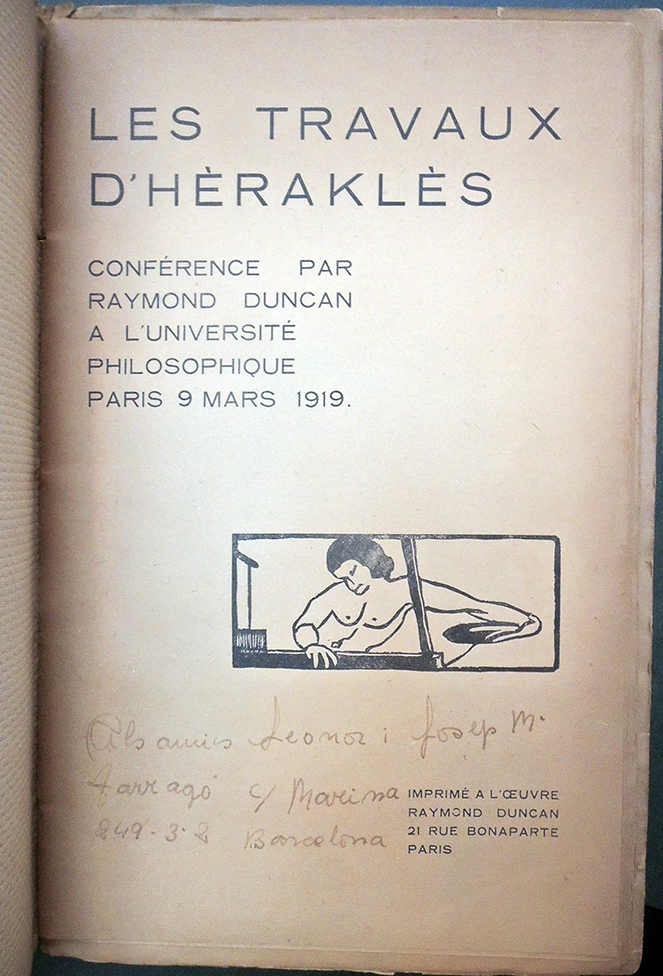 2 – Books published and printed by Raymond Duncan:
2 – Books published and printed by Raymond Duncan:
René Patris d’Uckermann. La Rose assassinée. Dialogue de fous. Paris: Imprimé par Raymond Duncan, avril 1922. Large 8vo. The booklet bears the achevé d’imprimer: “Ce livre a été imprimé par Raymond Duncan typographe fidèle aux muses”. Patris’ Dialogue de fous was presented by Raymond Duncan on April 26 1921 at the Comédie Montaigne and issued one year later at his quarters 34 rue de Colisée, on the right bank where he was temporarily established.
Marc-Auran. Le Jardin d’amour. Paris: Editions Raymond Duncan, 1937. 8vo, stitched. Limited in 500 copies.
Marc La Roche. Le Pré blanc. Paris: Editions de l’Akademia, 1940. 12mo, stapled. Limited to 25 copies. Illustrated with a portrait by the author.
René Le Scieller. Mon frère ressuscité. Scènes et récits. Paris: Akademia Raymond Duncan, 1947. 12mo. The number of copies issued is higher than usual (1,000). This may explain the use of conventional typefaces for the text. The author met Raymond Duncan in New York, where he worked at the United Nations. Long autograph inscription: “Au Président Edouard Herriot, que j’ai – témoin muet et jamais déçu – approché pendant des années…”.
Jacques de Marquette. Introduction à la mystique comparée. Hindouisme, bouddhismes, Grèce-Israël, Christianisme, Islam. Paris: Akademia Raymond Duncan, 1948. 8vo. Printed in 1,000 copies. Conference held at Lowell Institute in Boston. Complete with the erratum.
Louise Peabody Sargent (1856-1949). Collected Poems. Paris: Akademia Raymond Duncan, 1949. Large 8vo. Limited to 150 numbered copies. Peabody Sargent of Boston origin befriended Raymond Duncan. The collection of her poems is accompanied by 2 obituaries, the author having passed away when the book was under press.
Lillian Everts. While the Past Burns And Lost Edition. With translations in French. Paris: Editions Akademia Raymond Duncan, 1950. Large 8vo. A new printing type appears in this bilingual “de luxe” edition published as the Akademia Raymond Duncan prize for poetry. The poems received the Lantern Publication Award in 1945 and 1949. The translation is by Abel Doysié.
 Blanche Blanc. Mes poèmes. Paris: Akademia Raymond Duncan, 1951. 8vo. Poems printed in a different type than Duncan’s usual upper-case type.
Blanche Blanc. Mes poèmes. Paris: Akademia Raymond Duncan, 1951. 8vo. Poems printed in a different type than Duncan’s usual upper-case type.
Jehanne Louise Berenger. L’Alphabet de l’amour. Paris: Akademia Raymond Duncan, 1951. 8vo. Poems printed in a different type than Duncan’s usual upper-case type.
Ephemera
Invitation card to 3 piano concerts by André Asselin at the Akademia 31 rue de Seine, printed by Raymond Duncan.
Orson Welles / Around The World 1955 / Paris

